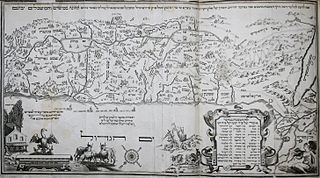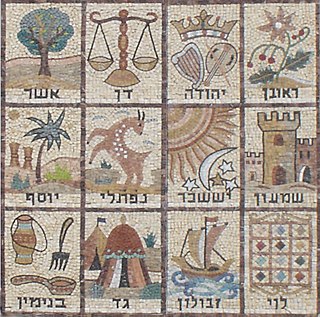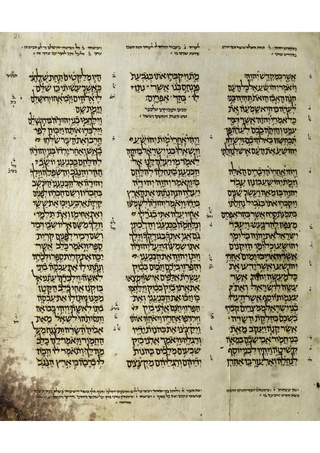Related Research Articles

The Kingdom of Israel, or the Kingdom of Samaria, was an Israelite kingdom in the Southern Levant during the Iron Age, whose beginnings can be dated back to the first half of the 10th century BCE. The kingdom controlled the areas of Samaria, Galilee and parts of Transjordan. The regions of Samaria and Galilee underwent a period with large number of settlements during the 10th century BCE, with the capital in Shechem, and then in Tirzah. The kingdom was ruled by the Omride dynasty in the 9th century BCE, whose political center was the city of Samaria.

According to the Hebrew Bible, the Tribe of Ephraim was one of the tribes of Israel. The Tribe of Manasseh together with Ephraim formed the House of Joseph. It is one of the ten lost tribes. The etymology of the name is disputed.

British Israelism is the British nationalist, pseudoarchaeological, pseudohistorical and pseudoreligious belief that the people of Great Britain are "genetically, racially, and linguistically the direct descendants" of the Ten Lost Tribes of ancient Israel. With roots in the 16th century, British Israelism was inspired by several 19th century English writings such as John Wilson's 1840 Our Israelitish Origin. From the 1870s onward, numerous independent British Israelite organizations were set up throughout the British Empire as well as in the United States; as of the early 21st century, a number of these organizations are still active. In the United States, the idea gave rise to the Christian Identity movement.
Christian Identity is an interpretation of Christianity which advocates the belief that only Celtic and Germanic peoples, such as the Anglo-Saxon, Nordic nations, or people of the Aryan race and people of kindred blood, are the descendants of the ancient Israelites and are therefore God's "chosen people". It is a racial interpretation of Christianity and is not an organized religion, nor is it affiliated with specific Christian denominations. It emerged from British Israelism in the 1920s and began to take shape during the 1940s-1970s. Today it is independently practiced by individuals, independent congregations, and some prison gangs.

Judah was, according to the Book of Genesis, the fourth of the six sons of Jacob and Leah and the founder of the Tribe of Judah of the Israelites. By extension, he is indirectly the eponym of the Kingdom of Judah, the land of Judea, and the word Jew.

The Tribe of Dan was one of the twelve tribes of Israel, according to the Torah. They were allocated a coastal portion of land when the people of Israel entered the Promised Land, later moving northwards.

United States in Prophecy was the original title of a publication that became known by its longer name of United States and British Commonwealth in Prophecy and published in various editions and formats after 1945. It was written under the byline of Herbert W. Armstrong who had assistance from staff members of Ambassador College. The publication related the views, beliefs and teachings of the Worldwide Church of God with regards to the identity of the so-called Ten Lost Tribes of Israel and for many years it was distributed as a companion booklet to 1975 in Prophecy! by the same author and publisher.
John Harden Allen was an American minister associated with the Church of God (Holiness), and British Israelism. He came from Illinois, later moving to Missouri in 1879. Originally a pastor in the Methodist Episcopal Church, he later became a pastor in the Wesleyan Methodist Church in California. He was one of the co-founders of the Church of God (Holiness) in 1883. He "evangelized throughout the West and eventually moved to Pasadena, California, where he died". Around 1917 he produced a publication entitled Stone Kingdom Herald.

The Twelve Tribes of Israel are, according to Hebrew scriptures, the descendants of the biblical patriarch Jacob, who collectively form the Israelite nation. The tribes were through his twelve sons through his wives, Leah and Rachel, and his concubines, Bilhah and Zilpah. In modern scholarship, there is skepticism as to whether there ever were twelve Israelite tribes, with the use of the number 12 thought more likely to signify a symbolic tradition as part of a national founding myth, although some scholars disagree with this view.
Several groups of people have claimed lineal descent from the Israelites, an ancient Semitic-speaking people who inhabited Canaan during the Iron Age. The phenomenon has become especially prevalent since the founding of the State of Israel in 1948. The country's Law of Return, which defines Jewishness for the purpose of aliyah, prompted many individuals to claim Israelite ancestry with the expectation that it would make them eligible for Israeli citizenship through their perceived Jewish ethnicity. The abundance of these claims has led to the rise of the question of "who is a Jew?" in order to determine the legitimacy of one's Jewish identity. Some of these claims have been recognized, while other claims are still under review, and others have been outright rejected.

Judges 1 is the first chapter of the Book of Judges, the seventh book of the Hebrew Bible or Old Testament, a sacred text in Judaism and Christianity. With the exception of the first verse, scholars have long recognised and studied the parallels between chapter 1 of Judges and chapters 13 to 19 in the preceding Book of Joshua. Both provide similar accounts of the purported conquest of Canaan by the ancient Israelites. Judges 1 and Joshua 15–19 present two accounts of a slow, gradual, and only partial conquest by individual Israelite tribes, marred by defeats, in stark contrast with the 10th and 11th chapters of the Book of Joshua, which portray a swift and complete victory of a united Israelite army under the command of Joshua.
Two House theology primarily focuses on the division of the ancient United Monarchy of Israel into two kingdoms, Israel and Judah. Two House theology raises questions when applied to modern peoples who are thought to be descendants of the two ancient kingdoms, both Jews and the ten lost tribes of the Kingdom of Israel. The phrase "the two houses of Israel" is found in the Book of Isaiah.

The Ten Lost Tribes were the ten of the Twelve Tribes of Israel that were said to have been exiled from the Kingdom of Israel after its conquest by the Neo-Assyrian Empire c. 722 BCE. These are the tribes of Reuben, Simeon, Dan, Naphtali, Gad, Asher, Issachar, Zebulun, Manasseh, and Ephraim---all but Judah, Benjamin, and some members of the priestly Tribe of Levi, which did not have its own territory. However, since the tribe of Simeon lived well within the territory of Judah, it is not clear why this tribe was never included in this list. Also, the tribes of Asher and Reuben were never mentioned as participating in anything after the conquest, living in either Phoenician (Asher) or Moabite (Reuben) controlled territory. By the middle 9th century BCE the territory of Gad was also (re)taken by the Moabites, so the Assyrians could at most have removed the other six tribes. Thus, the "10 tribes" appears to be a misnomer, meaning all of the Israelites that were living outside the Kingdom of Judah. The Jewish historian Josephus wrote that "there are but two tribes in Asia and Europe subject to the Romans, while the ten tribes are beyond Euphrates till now, and are an immense multitude, and not to be estimated by numbers".
Edward Hine originated the notion, still current in Anglo-Israelism and some strains of U.S. Christian fundamentalism, that modern Germans are partly descended from the ancient Assyrians. In this belief system, the British are the sole descendants of the Ten Lost Tribes of Israel, in opposition to other Anglo-Israelism advocates who included Germans in the lost tribes. Hine's view, instead, is that the German are descendants of the Assyrians. Hine's view, thus, considers the British as the Kingdom of Israel and the Germans as the Neo-Assyrian Empire. Those who believe this hold many pseudohistorical views in an attempt to back this view. This primordialist idea, like the Anglo-Israelism out of which it emerged, has no foundation in modern history, linguistics, or genetics.
Edward Hine was an influential proponent of British Israelism in the 1870s and 1880s, drawing on the earlier work of Richard Brothers (1794) and John Wilson (1840). Hine went as far as to conclude that "It is an utter impossibility for England ever to be defeated. And this is another result arising entirely from the fact of our being Israel."
French Israelism is the French nationalist belief that people of Frankish descent in general, and the Merovingian dynasty in particular, are the direct lineal descendants of the Ten Lost Tribes of Israel, specifically, the descendants of the Tribe of Benjamin.
The Anglo-Saxon Federation of America is a British Israelite group founded by Howard Rand in 1930.
Elieser Bassin (1840–1898) was a Russian-Jewish convert to Christianity, and an author and proponent of British Israelism.
Col. John Cox Gawler (1830–1882) was a Keeper of the Jewel House and British Israelite author.
Howard Rand, also known as Howard B. Rand and Howard Benjamin Rand was a lawyer, inventor, and three-time candidate for Massachusetts state office on the Prohibition Party ticket, He headed the former Anglo-Saxon Federation of America, a British Israelist group. He served from 1937 to 1968 as editor of its affiliate Destiny Publishers, which put out Destiny magazine.
References
- ↑ Gawler, John Cox (1880). Dan, the Pioneer of Israel: His Early Enterprise, His Settlements, and Connection with the Scythians. W. H. Guest.
- ↑ Allen, J. H. (1902). Judah's Sceptre and Joseph's Birthright. pp. 263–264.
- ↑ Hine, Edward (1870). The English Nation Identified with the Lost House of Israel by Twenty-Seven Identifications. Manchester: Heywood. p. v.
- ↑ Hine, Edward (1874). Life From The Dead. Vol. I. pp. 327–328.
- ↑ "nordiskisrael.dk". nordiskisrael.dk. Retrieved 2024-02-15.